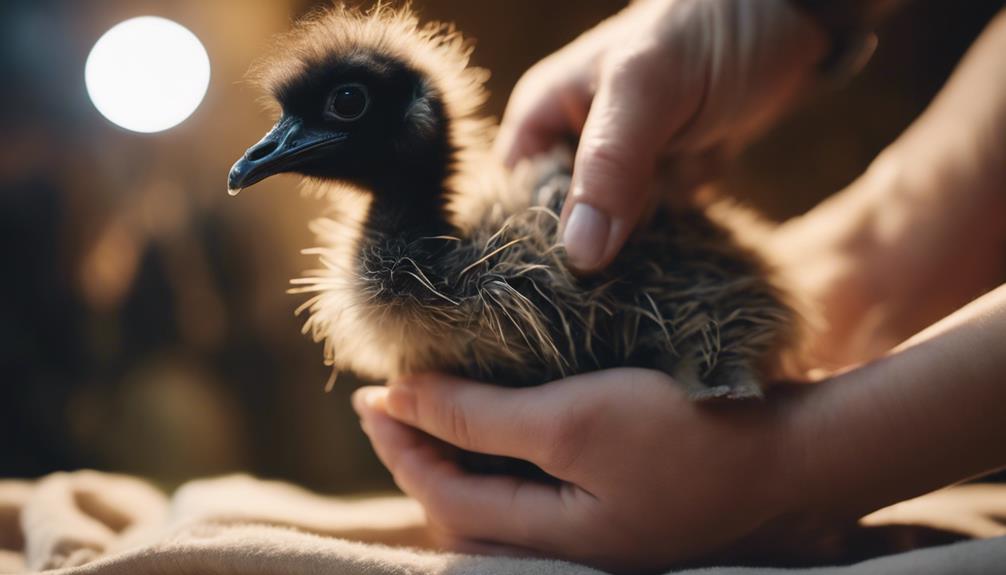
In the first weeks of caring for emu chicks, the clock will be your greatest ally. Understanding the crucial milestones and tasks during the initial phase can make or break the successful rearing of these unique creatures.
From setting up the right housing to ensuring their nutritional needs are met, each decision plays a pivotal role in their development.
Stay tuned to discover the key strategies for navigating the first 90 days with your emu chicks, ensuring they thrive under your attentive care.
Key Takeaways
- Provide secure, spacious housing with temperatures at 85-90°F for optimal growth.
- Feed emu chicks with 20-24% protein, fresh water, and necessary supplements for muscle development.
- Monitor growth, prevent diseases, and groom regularly for healthy development.
- Handle gently, socialize, and ensure safety with bonding rituals and predator prevention.
Emu Chick Housing

When raising emu chicks, it's crucial to provide them with a secure and comfortable housing environment to ensure their well-being and development. The shelter design plays a vital role in the growth of the chicks. Ensure that the housing is spacious enough to accommodate the growing chicks comfortably.
Emu chicks are sensitive to temperature changes, so it's essential to set up the incubator correctly. Maintain a temperature of around 85-90 degrees Fahrenheit in the incubator during the first few weeks of their lives.
The design of the shelter should also allow for easy cleaning to maintain a hygienic environment for the chicks. Regular cleaning of the bedding and nesting area is necessary to prevent the buildup of bacteria and ensure the chicks stay healthy.
Nutrition Requirements
To ensure the proper growth and health of your emu chicks, it's crucial to meet their specific nutrition requirements from an early age. Providing the right balance of nutrients is essential for their development. Here are some key points to consider:
- Protein Sources: Emu chicks require high-quality protein sources for optimal growth. Include feeds with a protein content of at least 20-24% to support their muscle development and overall health.
- Hydration Tips: Ensure that your emu chicks have access to fresh, clean water at all times. Proper hydration is vital for their digestion, temperature regulation, and overall well-being.
- Dietary Supplements: Consider incorporating dietary supplements into their feeding regimen to meet their growth milestones. Consult with a veterinarian or avian specialist to determine if additional vitamins or minerals are needed for your emu chicks' specific requirements.
Heat and Light Setup

For optimal care of your emu chicks, ensuring a proper heat and light setup is essential to mimic their natural environment and promote healthy growth and development. In the first 10 days, maintain a brooder setup with temperatures around 95-100°F (35-38°C) to provide the necessary warmth for your chicks. Gradually decrease the temperature by 5°F each week until reaching the ambient temperature by week 10. Monitor the temperature closely using a thermometer placed at chick level to avoid overheating or chilling.
When it comes to lighting, establish a consistent lighting schedule to simulate natural daylight patterns. Use heat lamps during the first few weeks to provide both warmth and light during the day. Emu chicks require approximately 14-16 hours of light per day to encourage healthy growth and maintain their natural rhythms. Ensure the light source isn't too bright or too dim, as this can disrupt their sleep patterns and overall well-being.
Handling and Socialization
Establish a gentle and consistent routine for handling and socializing your emu chicks to build trust and familiarity between you and the young birds. Bonding techniques are crucial in creating a strong connection with your chicks. Spend time with them daily, talking softly and offering treats to associate your presence with positive experiences. Emus are naturally curious, so use this to your advantage by engaging in handling skills that are gentle and non-threatening.
Here are some socialization tips to help your emu chicks thrive:
- Create Interaction Games: Emus are intelligent birds that enjoy mental stimulation. Develop simple games like hiding treats for them to find or using a feather toy to encourage play and exercise.
- Encourage Exploration: Allow your emu chicks to explore their surroundings under supervision. This helps them build confidence and adapt to new environments.
- Regular Positive Reinforcement: Reward good behavior with treats or verbal praise to reinforce positive interactions and encourage trust between you and your emu chicks.
Health Check-ups
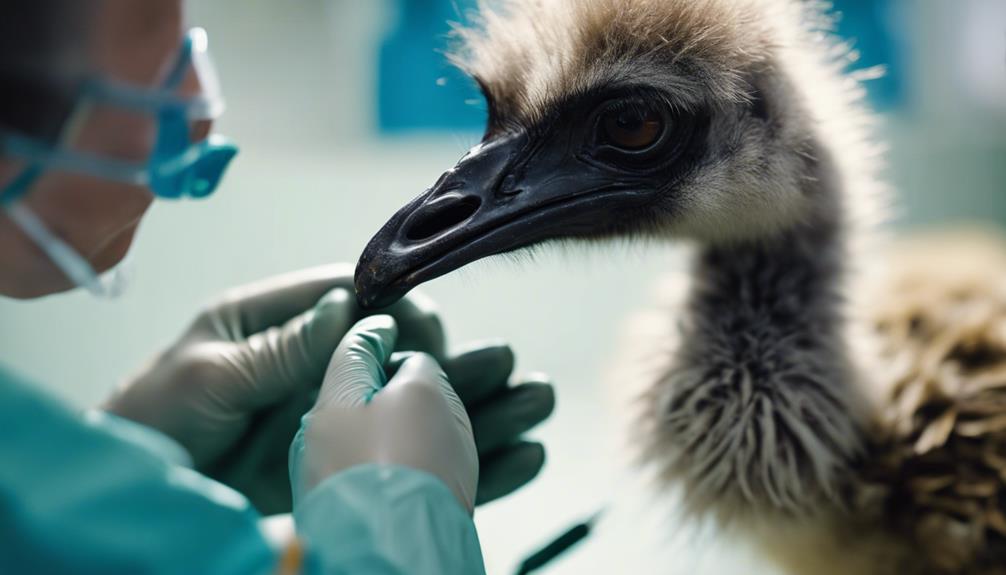
As you continue to nurture and bond with your emu chicks, monitoring their health through regular check-ups is essential for their overall well-being. Ensuring they reach growth milestones is crucial. Regular weight monitoring helps track their progress and ensures they're developing as expected. During health check-ups, it's also important to focus on disease prevention. Emu chicks can be susceptible to various illnesses, so staying proactive in their healthcare is key.
In addition to growth and disease prevention, parasite control is another critical aspect of their health check-ups. Emu chicks can be vulnerable to parasites, which can hinder their growth and overall health. Regularly checking for and treating parasites will help keep your chicks healthy and thriving.
Feeding Schedule
Maintain a consistent and well-balanced feeding schedule to ensure the optimal growth and health of your emu chicks. When it comes to feeding your emu chicks, consistency is key in promoting healthy development. Here are some essential tips for creating a successful feeding schedule:
- Feeding Frequency: Emu chicks should be fed multiple times a day to support their rapid growth. Aim for feeding them at least 4-5 times daily to meet their nutritional needs adequately.
- Growth Milestones, Dietary Adjustments: Monitor your emu chicks' growth milestones closely and adjust their diet accordingly. As they grow, their nutritional requirements will change, so be prepared to modify their feed to meet their evolving needs.
- Weaning Process: Start the weaning process around 8-12 weeks of age by gradually introducing solid foods while reducing the frequency of feeding. This gradual transition will help them adapt to their adult diet smoothly.
Watering Needs
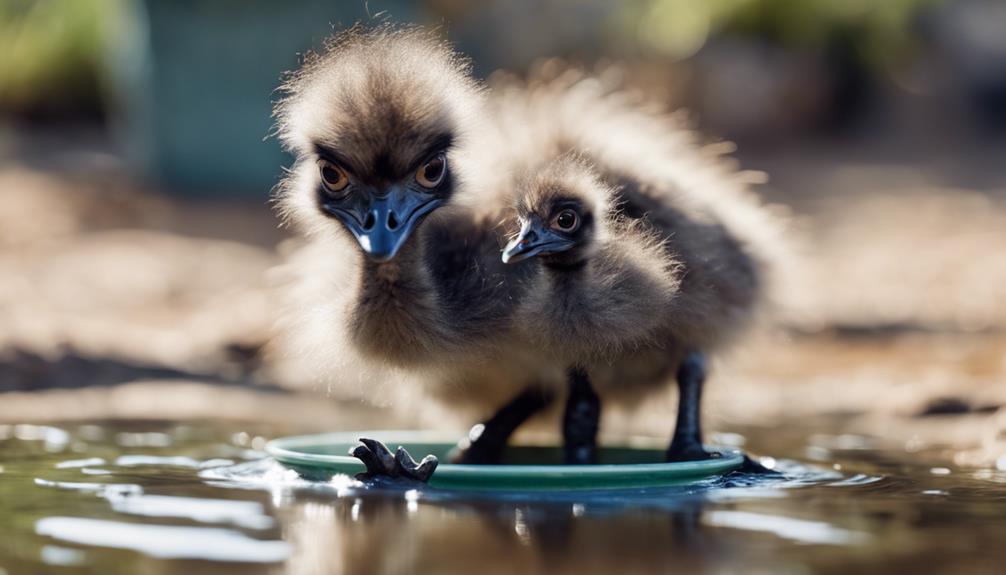
To ensure the optimal health and growth of your emu chicks, addressing their watering needs is essential for their overall well-being. Emu chicks require constant access to fresh, clean water to stay hydrated. Watering frequency is crucial; ensure that water is available at all times, especially during hot weather or after feeding. Emu chicks are prone to dehydration, so it's important to monitor their water intake regularly.
When caring for emu chicks, consider using shallow water dishes or troughs to prevent accidental drowning. Make sure the water containers are secure and stable to avoid spills or contamination. Emu chicks may also benefit from occasional misting or spraying during hot days to help them cool down and maintain proper hydration levels.
In addition to providing clean water, consider adding electrolytes to their water supply to boost hydration and support their overall health. These simple hydration tips can make a significant difference in the well-being of your emu chicks during the crucial first 90 days of their lives.
Space and Enclosure
Ensuring adequate space and proper enclosure for your emu chicks is crucial for their health and safety. Here are some key factors to consider:
- Ample Outdoor Exploration: Emu chicks are naturally curious creatures and require space to roam and explore. Ensure that their outdoor area is secure, free from potential predators, and has enough room for them to exercise and exhibit natural behaviors.
- Comfortable Indoor Enrichment: While outdoor space is vital, indoor areas also play a significant role in the well-being of your emu chicks. Provide enriching elements such as toys, perches, and hiding spots to stimulate their minds and keep them active even when confined indoors.
- Proper Enclosure Size: Emu chicks grow rapidly, so it's essential to have an enclosure that accommodates their increasing size. Ensure that the space allows them to move freely, stretch their legs, and flap their wings without restrictions. A spacious environment contributes to their physical development and overall happiness.
Behavior Observation
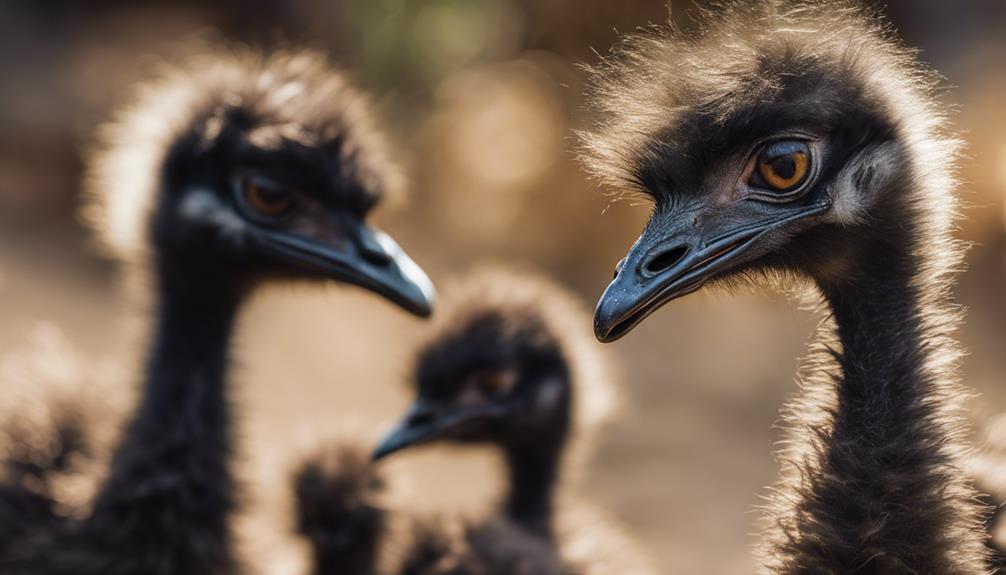
Regularly observe the behavior of your emu chicks to monitor their health and well-being effectively. Pay close attention to their vocalization patterns, as changes could indicate distress or illness. Emu chicks typically make soft chirping sounds when content, but loud or constant vocalizations might signal discomfort. Additionally, observe their sleep habits; emu chicks require plenty of rest, so irregular sleeping patterns could be a cause for concern.
Emu chicks engage in play behavior as a way to learn and develop physical skills. Encourage their playful antics by providing safe toys and space for exploration. Bonding rituals are also crucial for the social development of your emu chicks. Watch for signs of bonding such as mutual grooming, following each other closely, and huddling together for warmth.
Growth Monitoring
Monitor the growth of your emu chicks by regularly assessing their physical development milestones and comparing them to age-appropriate standards. Keeping track of their progress is crucial to ensuring they're healthy and thriving. Here are some key aspects to focus on:
- Weight Tracking: Weigh your emu chicks regularly to monitor their growth progress. A steady increase in weight is a positive indicator of their overall health and development.
- Feather Development: Keep an eye on the development of their feathers. Healthy feather growth is essential for their ability to regulate body temperature and protect themselves.
- Size Comparison and Growth Milestones: Compare the size of your emu chicks to standard growth milestones for their age. This will help you ensure they're growing at a healthy rate and reaching the appropriate size for their age.
Grooming Practices
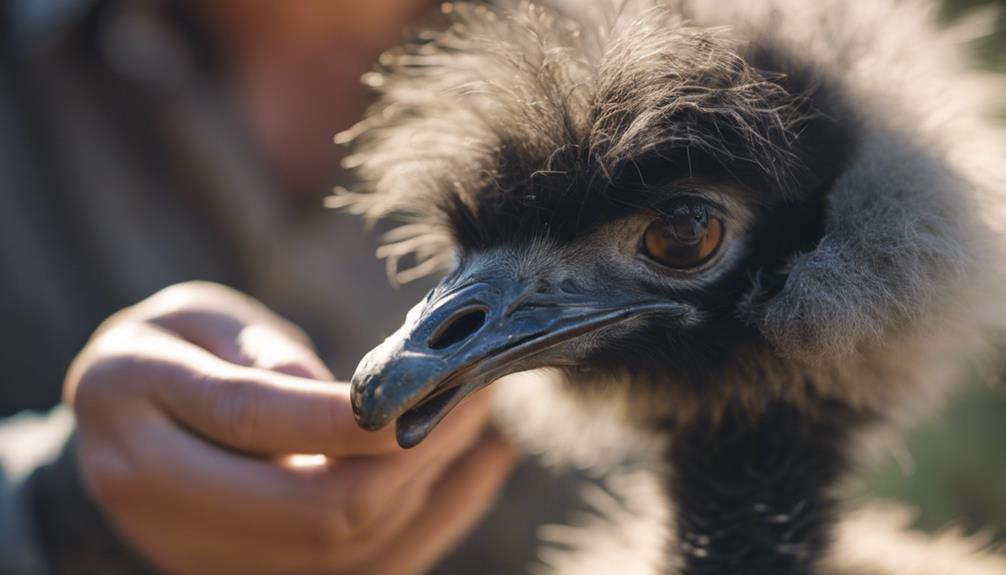
To maintain the health and well-being of your emu chicks, it's essential to establish a grooming routine that includes regular feather checks and cleaning. Feather care is crucial to prevent issues like mites or feather loss. Emu chicks are naturally clean birds, but they might need some assistance in hard-to-reach areas. Gently inspect their feathers for any signs of damage, parasites, or dirt accumulation. If you notice any issues, address them promptly to avoid potential health problems.
When it comes to bathing techniques, emu chicks enjoy a good dust bath. Provide a shallow container with fine dust or sand, as they'll roll around in it to keep their feathers in top condition. Avoid water baths unless absolutely necessary, as emus aren't fond of getting wet. Regular dust baths will help them maintain their plumage and remove excess oils. By incorporating these grooming practices into your routine, you can ensure your emu chicks stay healthy and happy.
Safety Measures
Implementing proper safety measures is imperative to safeguard the well-being of your emu chicks in their environment. When caring for these vulnerable creatures, you must prioritize their safety above all else. Here are three key safety measures to consider:
- Predator Prevention: Emu chicks are susceptible to attacks from predators such as foxes, dogs, and birds of prey. Ensure their enclosure is secure with fences buried underground to prevent digging and covered overhead to deter aerial threats.
- Biosecurity Measures: Minimize the risk of diseases by implementing strict biosecurity protocols. This includes disinfecting equipment, limiting visitors to the chick area, and quarantining sick birds.
- Emergency Protocols and First Aid Training: Prepare for unforeseen circumstances by having emergency procedures in place. Familiarize yourself with basic first aid techniques for treating common injuries like cuts or sprains.
Frequently Asked Questions
Can Emu Chicks Be Raised Alongside Other Types of Poultry, Such as Chickens or Ducks?
Yes, you can raise emu chicks alongside chickens or ducks. Ensure compatibility by introducing them slowly, providing adequate space and monitoring interactions. Use socialization techniques like supervised mingling to promote positive relationships between the different species.
What Are Some Common Behavioral Differences Between Male and Female Emu Chicks?
When observing male and female emu chicks, you'll notice distinct behavioral differences. Males are often more assertive in social interactions, while females tend to be more cautious. Additionally, males may exhibit more aggressive feeding habits compared to females.
Are There Any Specific Toys or Enrichment Activities That Can Help Keep Emu Chicks Entertained and Stimulated?
To keep your emu chicks entertained and stimulated, provide enrichment activities like puzzle feeders for cognitive development. Socialization through supervised interactions with other chicks promotes bonding. Offer exercise opportunities such as obstacle courses to keep them active and healthy.
How Can I Protect My Emu Chicks From Predators, Such as Foxes or Hawks?
To protect your emu chicks from predators like foxes or hawks, you must fortify like your chicks are royalty! Predator-proofing strategies, such as secure enclosures and guard animals like dogs, are your best bet to keep those chicks safe and sound.
Are There Any Potential Zoning or Legal Restrictions to Consider When Raising Emu Chicks on a Residential Property?
When raising emu chicks on your residential property, be aware of potential zoning and legal restrictions. Check local ordinances for rules on livestock, noise, and land use. Compliance with these regulations is crucial for a smooth experience.
Conclusion
In conclusion, caring for emu chicks in the first 90 days is a rewarding but challenging task.
Did you know that emu chicks can grow up to 9 inches in just the first month of life?
By following proper housing, nutrition, and handling practices, you can ensure the health and well-being of your emu chicks as they grow and develop.
Remember to always prioritize their safety and monitor their progress closely.
Happy emu chick raising!




